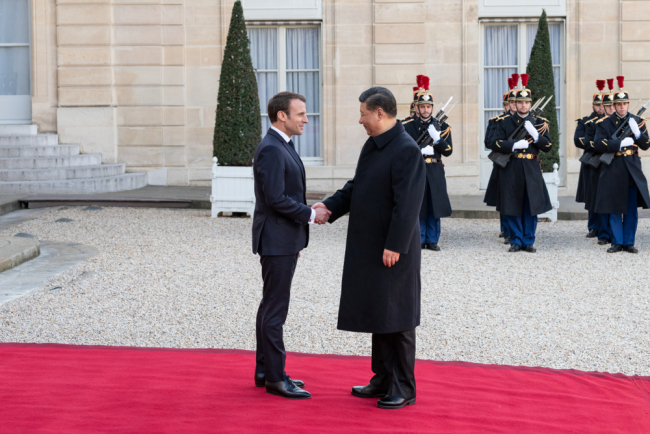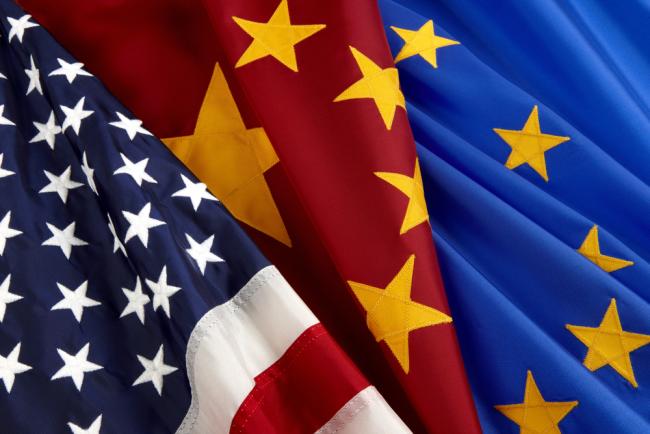Europe and the Geopolitics of 5G: Walking a Technological Tightrope
The acute Sino-American tensions which started in 2018 have been coupled with controversies around 5G technology, exemplified by the spotlight placed on Chinese equipment manufacturer Huawei and the security risks associated with its use. For Europe, the 5G challenge at the international level is drawing a very complex landscape.
Le cloud défense : défi opérationnel, impératif stratégique et enjeu de souveraineté
Cloud computing – or data management – is considered as one of the pillars of the digital transformation of the French Ministry of the Armed Forces.
The Changing Landscape of European Cloud Computing: Gaia-X, the French National Strategy, and EU Plans
Non-European cloud service providers host the vast majority of European data, which is viewed as an economic as well as a political problem. Gaia-X, European governments and the European Union aim to bolster the European cloud market while responding to data privacy and cybersecurity concerns.
USA/Europe: Seven Digital Challenges
As a consequence of the positive momentum in Transatlantic relations brought about by the arrival of the Biden administration, significant progress is expected on a range of key digital issues.
Baden-Württemberg under Green Leadership – Balance Sheet of Two Government Periods under Winfried Kretschmann
Baden-Württemberg's economic and social structure offered good starting conditions for center-right parties from the beginning, which the Christian Democratic Union of Germany (CDU) initially knew how to use for itself. From 1953 to 2011 the Prime Minister belonged to the CDU. In 2011 the Greens and the Social Democratic Party of Germany (SPD) won an election over the CDU for the first time. Winfried Kretschmann was elected the first Green Prime Minister in a German state.
The German Green Party, a new People's Party?
In the context of increasing awareness of the climate crisis, environmental parties across the EU obtained high scores in the European elections of May 2019, reaching 20% in Germany, 17% in Ireland, 16% in Finland and 13 % in France. Meanwhile, far-right parties gained strength.
France’s incoherent China policy confuses partners
On 21 July 2020, French Minister of Economy and Finance Bruno Le Maire participated remotely in the High Level Economic and Financial Dialogue with Chinese Vice Premier Hu Chunhua.
Technology Strategies in China and the United States, and the Challenges for European Companies
As international relations are increasingly reorganized around the US-China rivalry, the tensions between these two great powers are shaping a growing number of sectors, and the exchange of sensitive technologies in particular. This is a critical issue for European companies today.
Japan’s Trade Policy in the Midst of Uncertainty
The multilateral trading system under the World Trade Organization (WTO) has been of the utmost importance for Japan’s trade policy.
Armed Violence in the Sahara. Are We Moving From Jihadism to Insurgency?
While everyone is questioning the effectiveness of the anti-terrorist response in the Sahel, the first challenge is to ensure that the jihadist phenomenon in the Sahel is fully understood.
Governing the Geostationary Orbit: Orbital Slots and Spectrum Use in an Era of Interference
Outer space, particularly in the telecommunication sector, is benefiting and becoming accessible to more and more actors. But with this trend comes also a reality that is every day more compelling: no meaningful development can be achieved without a clear, stable and predictable interference-free environment for the use and control of all satellites that depend upon ready access to radio frequencies and appropriate geostationary orbital slots to function properly.

Internet, accélérateur des transformations de la Russie
La crise économique mondiale survenue en 2008, qui s’est durement répercutée en Russie, a cristallisé le mécontentement de la population, en particulier des classes moyennes et supérieures. Ce ressentiment, les réseaux sociaux et les blogs permettent de l’exposer sur la « place publique » en obtenant une résonance significative. Cette évolution n’est pas propre à la Russie ; elle est générationnelle.
Disponible sur Cairn
Internet Companies in China: Dancing between the Party Line and the Bottom Line
With over 500 million Internet users and 900 million mobile-phone subscribers by mid-2011, the Chinese Internet is an enormous market that has produced the spectacular rise of many Chinese Internet companies and attracted substantial foreign investment. This paper argues that, despite a great degree of liberalization of its market over the past 15 years, the Chinese Internet remains authoritarian in nature. Not only did the central government actively shape the infrastructure and rules of China's information superhighways, but recently it has also vigorously built state-controlled Internet companies, including a national search engine.
The Financial Challenges of the Sub-Saharan Africa Telecoms Boom
Telecom industry has taken a significant place within of the economy of most African countries. In this aspect, it is an undeniable source of economic growth and development. It impacts on the financial sphere at three levels.
Support independent French research
Ifri, a foundation recognized as being of public utility, relies largely on private donors – companies and individuals – to guarantee its sustainability and intellectual independence. Through their funding, donors help maintain the Institute's position among the world's leading think tanks. By benefiting from an internationally recognized network and expertise, donors refine their understanding of geopolitical risk and its consequences on global politics and the economy. In 2025, Ifri supports more than 80 French and foreign companies and organizations.















